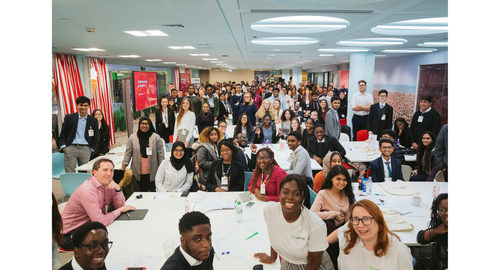
Ambassador View: What to Do After Work Experience
Hello everyone - I’m Sarah, a first year law student at the University of Oxford and an Uptree Ambassador! I first discovered Uptree just as the first lockdown started, back when I was in Year 12, and have since completed several rewarding online insight days with various companies.

This blog is best read after Jamie’s blog from last year about making the most out of your work experience and will help ensure you maximise your knowledge, connections and employability skills. These work experience tips equally apply to singular days as well as the traditional week-long programme, online or in-person. Any insight into your chosen sector is invaluable (especially if you follow these top tips) - the best experiences are not necessarily the longest, but the ones that you learn from the most.
Developing employability and consolidating knowledge
When it comes to future job applications, every bit of work experience is important, including those that don't feel immediately relevant. As long as you're able to explain the transferable skills you gained, all experience can be beneficial. Making a list of the activities you participated in during the work experience is much easier the sooner you do it and is crucial for applications! Aim to condense each work experience into maximum five or six bullet points - this structure is perfect for adding to your LinkedIn or a CV.

An example of work experience bullet point notes:
- Worked with a team of four to pitch a challenge in front of partners, placing second overall
- Acted as secretary, responsible for taking notes and keeping time
- Participated in a networking session with trainees and other students
- Developed my commercial awareness by researching a fictional client’s business and providing advice
- Utilised Adobe Illustrator and Microsoft Excel to create graphics and spreadsheets
Making connections
As a student, it can be tricky to meet people in industries of interest as the opportunity does not come around often. Work experience can be the perfect chance to develop industry connections, as it's usually structured to allow you to meet people from all levels and areas of the business. Make sure you take a note of the people leading your sessions or doing talks and connect with them on LinkedIn afterwards, sending a personalised request. As many work experience programmes and insight days are run by graduate recruitment teams, I would strongly recommend also sending them a LinkedIn request, as they often share deadlines and tips for internship applications.
The same applies for your fellow work experience students - make sure to stay in contact! Knowing people who wish to pursue the same career path can make applications feel less daunting and isolating. This is especially important for online work experience as you miss the face-to-face networking aspect. Uptree’s #FuturesUP day with Clifford Chance in March 2020 was the first online event I attended and I still keep in touch with the people I “met” now!

What’s next?
This work experience does not have to be the end of your journey! You should always take time to reflect about the positives (and negatives) of the programme. The following questions may help structure your insight.
- Did you learn anything new? Is there anything you will now research in more detail - for example, a new career within the sector you had no idea about?
- Will you apply for future schemes with this company? When is the next application deadline? Make sure to use the tips in the first section when applying!
- Is there anything that you didn’t like about the work experience? For example, would you rather work for a company with a more local or regional focus?
Uptree’s upcoming events are a great place to start if you either want to learn more about a specific firm or sector, or if you want to branch out and try something new. Additionally, if you have any questions about the company, try reaching out on LinkedIn to your new connections who will most likely be willing to help.
Conclusion
Of course, the most important thing to do after you’ve completed work experience is to take some time to relax! These tips work best when the things you’ve done are fresh in your mind, but it's also essential to look after yourself to avoid burnout.
Uptree thanks Sarah for taking the time to share her experiences and advice on what to do once you have completed work experience. Why not see what events and opportunities we have available?
By Uptree
Published on:
Wed 2 Mar 2022